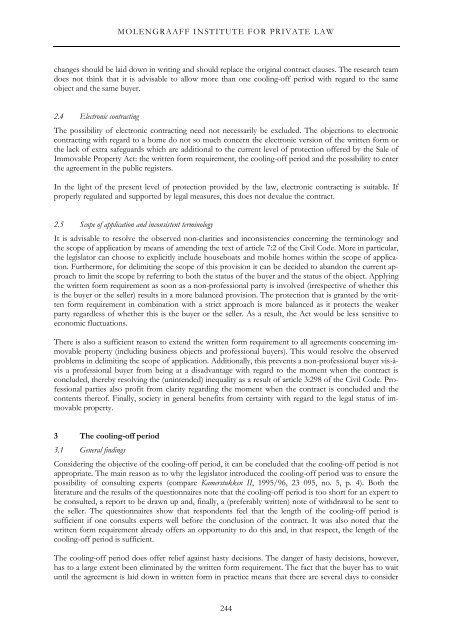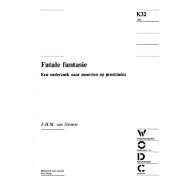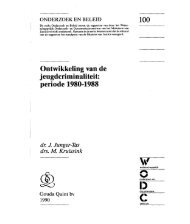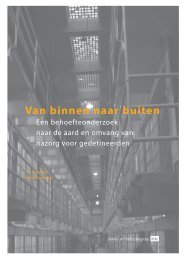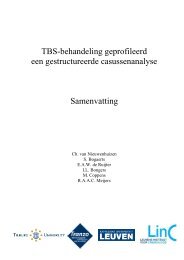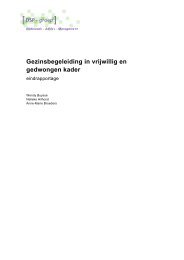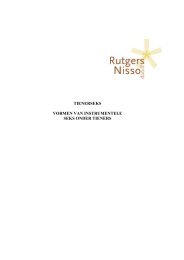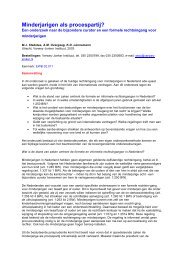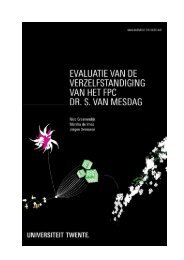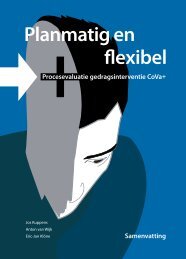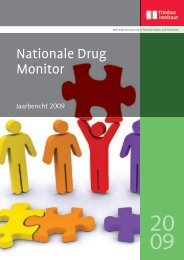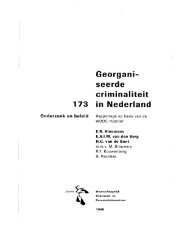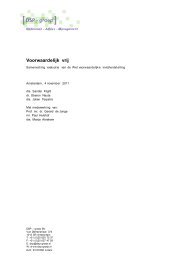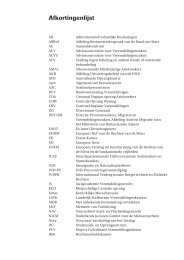Wet Koop onroerende zaken; de evaluatie - WODC
Wet Koop onroerende zaken; de evaluatie - WODC
Wet Koop onroerende zaken; de evaluatie - WODC
You also want an ePaper? Increase the reach of your titles
YUMPU automatically turns print PDFs into web optimized ePapers that Google loves.
MOLENGRAAFF INSTITUTE FOR PRIVATE LAW<br />
changes should be laid down in writing and should replace the original contract clauses. The research team<br />
does not think that it is advisable to allow more than one cooling-off period with regard to the same<br />
object and the same buyer.<br />
2.4 Electronic contracting<br />
The possibility of electronic contracting need not necessarily be exclu<strong>de</strong>d. The objections to electronic<br />
contracting with regard to a home do not so much concern the electronic version of the written form or<br />
the lack of extra safeguards which are additional to the current level of protection offered by the Sale of<br />
Immovable Property Act: the written form requirement, the cooling-off period and the possibility to enter<br />
the agreement in the public registers.<br />
In the light of the present level of protection provi<strong>de</strong>d by the law, electronic contracting is suitable. If<br />
properly regulated and supported by legal measures, this does not <strong>de</strong>value the contract.<br />
2.5 Scope of application and inconsistent terminology<br />
It is advisable to resolve the observed non-clarities and inconsistencies concerning the terminology and<br />
the scope of application by means of amending the text of article 7:2 of the Civil Co<strong>de</strong>. More in particular,<br />
the legislator can choose to explicitly inclu<strong>de</strong> houseboats and mobile homes within the scope of application.<br />
Furthermore, for <strong>de</strong>limiting the scope of this provision it can be <strong>de</strong>ci<strong>de</strong>d to abandon the current approach<br />
to limit the scope by referring to both the status of the buyer and the status of the object. Applying<br />
the written form requirement as soon as a non-professional party is involved (irrespective of whether this<br />
is the buyer or the seller) results in a more balanced provision. The protection that is granted by the written<br />
form requirement in combination with a strict approach is more balanced as it protects the weaker<br />
party regardless of whether this is the buyer or the seller. As a result, the Act would be less sensitive to<br />
economic fluctuations.<br />
There is also a sufficient reason to extend the written form requirement to all agreements concerning immovable<br />
property (including business objects and professional buyers). This would resolve the observed<br />
problems in <strong>de</strong>limiting the scope of application. Additionally, this prevents a non-professional buyer vis-àvis<br />
a professional buyer from being at a disadvantage with regard to the moment when the contract is<br />
conclu<strong>de</strong>d, thereby resolving the (uninten<strong>de</strong>d) inequality as a result of article 3:298 of the Civil Co<strong>de</strong>. Professional<br />
parties also profit from clarity regarding the moment when the contract is conclu<strong>de</strong>d and the<br />
contents thereof. Finally, society in general benefits from certainty with regard to the legal status of immovable<br />
property.<br />
3 The cooling-off period<br />
3.1 General findings<br />
Consi<strong>de</strong>ring the objective of the cooling-off period, it can be conclu<strong>de</strong>d that the cooling-off period is not<br />
appropriate. The main reason as to why the legislator introduced the cooling-off period was to ensure the<br />
possibility of consulting experts (compare Kamerstukken II, 1995/96, 23 095, no. 5, p. 4). Both the<br />
literature and the results of the questionnaires note that the cooling-off period is too short for an expert to<br />
be consulted, a report to be drawn up and, finally, a (preferably written) note of withdrawal to be sent to<br />
the seller. The questionnaires show that respon<strong>de</strong>nts feel that the length of the cooling-off period is<br />
sufficient if one consults experts well before the conclusion of the contract. It was also noted that the<br />
written form requirement already offers an opportunity to do this and, in that respect, the length of the<br />
cooling-off period is sufficient.<br />
The cooling-off period does offer relief against hasty <strong>de</strong>cisions. The danger of hasty <strong>de</strong>cisions, however,<br />
has to a large extent been eliminated by the written form requirement. The fact that the buyer has to wait<br />
until the agreement is laid down in written form in practice means that there are several days to consi<strong>de</strong>r<br />
244


